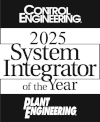
This article provides an overview of a recent webinar hosted by E Tech Group directors Pradeep Paul and Vivek Puthezath on the benefits of manufacturing intelligence initiatives. The full webinar is available for viewing here.
E Tech Group’s Director of Manufacturing Intelligence Pradeep Paul joined Director of Sales and Marketing Vivek Puthezath for a conversation about the tangible benefits manufacturers can readily obtain through manufacturing intelligence (MI) initiatives.
Manufacturing intelligence involves collecting and analyzing data from factory equipment and processes to improve operational efficiency and productivity. Pradeep and Vivek’s team specializes in guiding clients through every step of the process, from facility assessment and identification of opportunities to the implementation of tailored MI solutions.
During the webinar titled, “Separating Hype from Reality in Manufacturing Intelligence,” Paul and Puthezath stressed that these solutions are effective and affordable for any size production facility, regardless of its maturity level. The solutions are predominantly software as a service (SaaS)-based, resulting in a low barrier to entry. Minimal investment in new hardware and no advanced engineering expertise are required for support.
Some of the highlights and important discussion points from the webinar are discussed below.
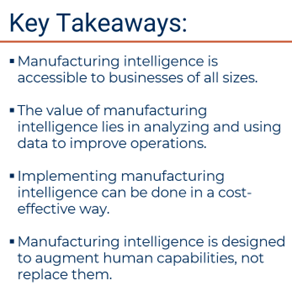
Manufacturing’s Data Paradox: Abundant Inputs, Scarce Insights
Today’s manufacturing facilities generate enormous amounts of descriptive process data. However, fully utilizing this data is challenging because it often resides in hard-to-access data silos, scattered across disparate systems throughout the enterprise. Inadequate connectivity stemming from outdated IT/OT infrastructure further compounds the problem and the overall result is that essential information is difficult to access when it’s needed.
The field of manufacturing intelligence strives to overcome these challenges by increasing facility integration and aggregating data such that it can be readily analyzed, visualized, and ultimately reveal the relationships between process parameters and product-related outcomes.
High-quality datasets from an operation or process are the primary inputs to yielding effective benefits from manufacturing intelligence initiatives. While data aggregation is a crucial step, it is not the ultimate goal. The real value lies in effectively analyzing the data into actionable insights that improve processes, optimize operations, and ultimately drive innovation.
Differentiating Business, Manufacturing and Artificial Intelligence
While business intelligence solutions analyze a company’s overall business data for insights leading to improved decision-making, manufacturing intelligence is a subset that focuses specifically on process-related data to gain insights that ultimately improve overall equipment effectiveness (OEE) metrics of a plant’s operations.
Platforms for both branches of intelligence may incorporate artificial intelligence methodologies, including mathematical modeling techniques like machine learning and deep learning to find relationships between operational variables and outcomes. Likewise, both may incorporate data visualization dashboards to help users understand their data.
In the case of manufacturing intelligence, given the right datasets, analytics-derived models can make predictions with respect to process outcomes and equipment maintenance needs. They can also suggest prescriptive actions to move toward a desired outcome.
Analytics in Manufacturing: A Progression of Insights
Manufacturing intelligence insights can be divided into four categories of increasing complexity and value:
- Descriptive insight into the current state of operation within the plant (what is happening right now?)
- Diagnostics insight into the driving factors that influence operations (why is it happening?)
- Predictive insight into the conditions that lead to specific operational outcomes (when will it happen?)
- Prescriptive insight into actions that help avoid a particular outcome (what can be done?)
While most manufacturers remain at the “descriptive” analytics stage because of data siloing challenges, by investing in methodologies to increase connectivity and effectively aggregate data, they can lay the foundation necessary to achieve the higher-level insights using advanced data analysis platforms.
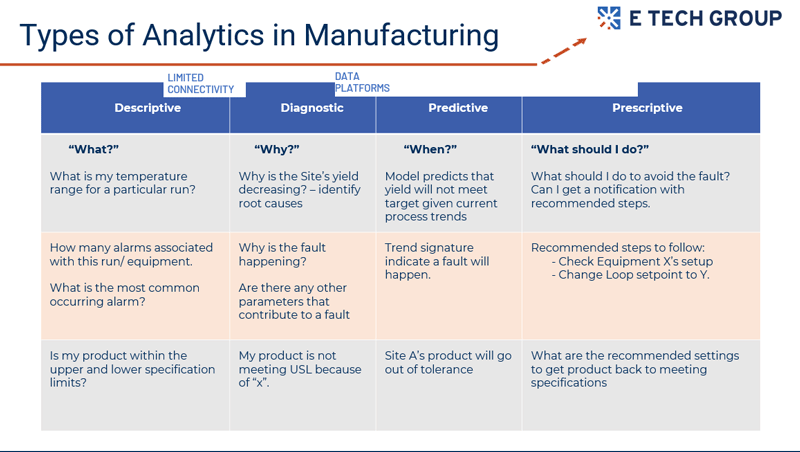
Figure 1: As system connectivity and integration increase, analytics platforms can be used to provide increasingly valuable information
A Digital SME for Data Visibility and Accessibility
Because process data visibility and accessibility are critical to understanding an operation, implementing a platform that can aggregate data from disparate sources can support the work of many different manufacturing professionals. Within E Tech Group’s manufacturing intelligence team, this type of platform is called a digital subject matter expert (digital SME). Its role is to interface with all data systems within the organization including the SCADA, MES, historian, and PLCs to become a singular source of information.
E Tech Group’s manufacturing intelligence team collaborates with clients to implement digital SMEs, creating this unified analysis interface. This platform lays the foundation for the following benefits:
- Root cause analysis: With all data in a single platform, determining the underlying causes of anomalies or failures is easier.
- Dashboard creation: Design customizable and interactive dashboards that provide real-time data visualization. Dashboards can vary by user login so that relevant data is depicted for differing roles within the organization, including alarm annotations to improve shift handover communication.
- Trend analysis and trend comparisons: Identify patterns and changes over time to monitor operational efficiency.
- Equipment-based filtering: Focus analysis on specific pieces of equipment to diagnose operational issues or optimize performance.
- Batch analytics: Analyze data collected from specific production batches to assess quality and consistency.
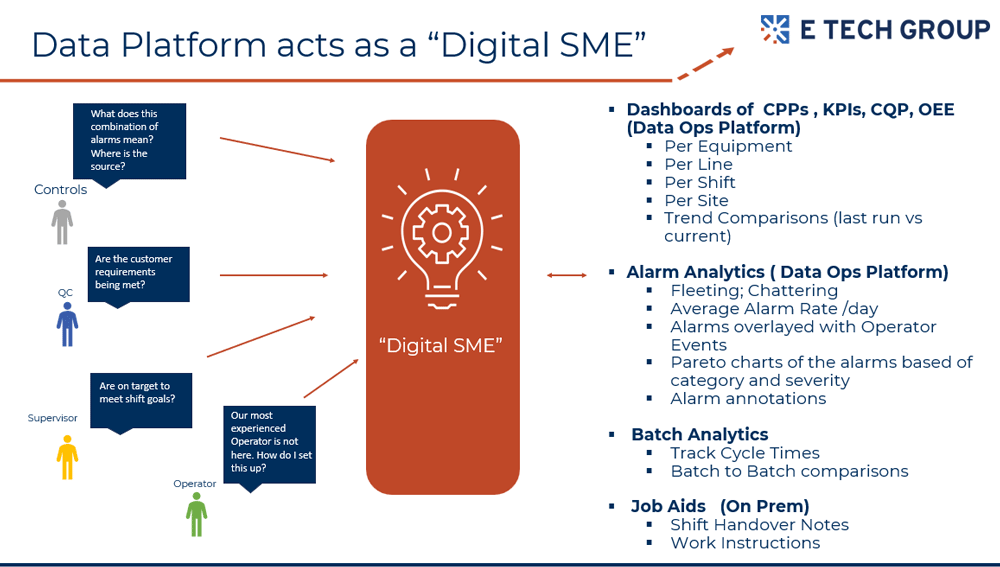
Figure 2: A Digital SME aggregates essential information required by many manufacturing professionals.
Energy Management and Sustainability
The collection and analysis of energy usage patterns throughout a manufacturing facility is another powerful manufacturing intelligence pursuit. Rockwell Automation’s Energy Manager is a SaaS-based tool that provides these in-depth insights. Utility monitoring sensors are installed throughout the facility to collect energy consumption data. Within a week, Energy Manager can fully analyze this data, providing the manufacturer with valuable knowledge about the inherent utility costs of their products. It can identify peak load periods, compare usage across different production lines, and give insights on the typically unseen additional energy burden of operating legacy equipment.
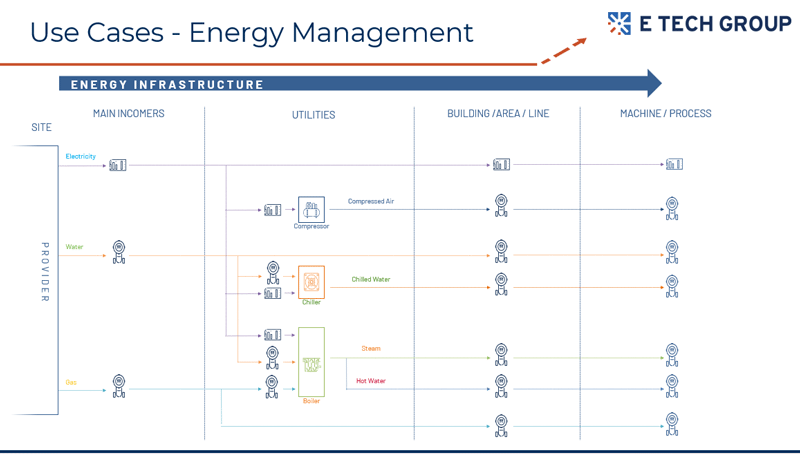
Figure 3: To utilize Rockwell Automation’s Energy Manager, electricity, water, and gas meters are installed throughout the facility to measure each utility’s use by building, area, or line, down to each individual machine or process.
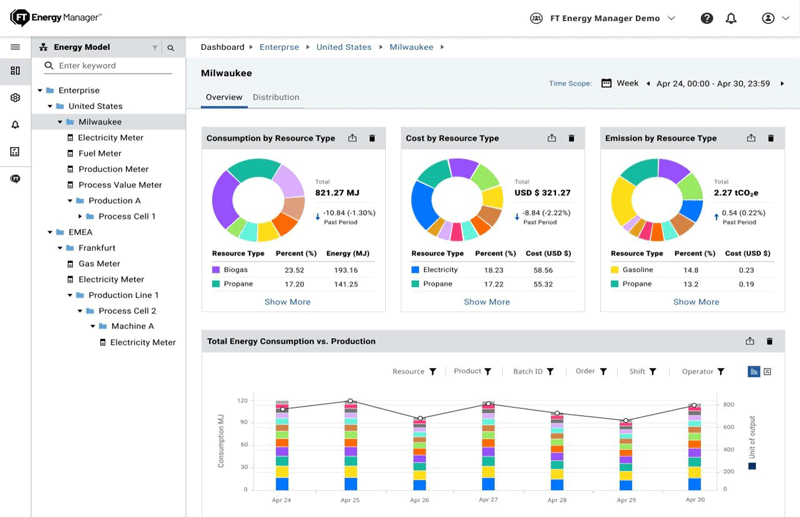
Figure 4: Rockwell Automation’s Energy Manager uses data from installed utility meters to analyze resource use by area, process, machine, or product.
Process Optimization: Prescriptive Analytics with Oden Technologies
To help clients reach the most advanced data analysis insights, prescriptive analytics, E Tech Group has partnered with Oden Technologies. This company has developed an analytics platform that provides predictive intelligence in real time to optimize a production process. Using six months of process data, machine learning algorithms model the system, identifying the critical parameters that impact important metrics like product quality, waste production, and operational cost. Once deployed, the model can predict the expected product outcome in real time during production and suggest adjustments to process parameters.
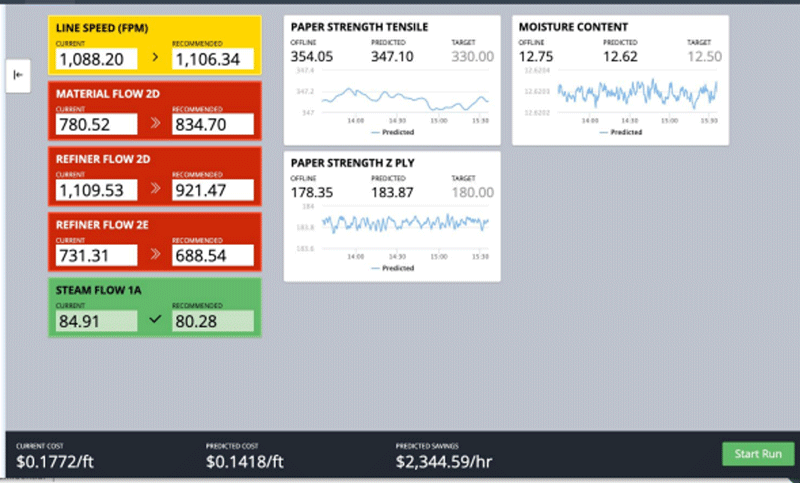
Figure 5: Oden Technologies’ advanced analytics platform provides real-time prescriptive analytics for process optimization.
As industrial manufacturing continues to embrace digitalization strategies, effective facility connectivity has become more crucial than ever. Access to diverse, high-quality datasets is foundational to manufacturing intelligence tools which deliver the actionable insights a manufacturer needs to further optimize their processes, including waste reduction, energy conservation, and efficiency improvements. Because these tools are primarily SaaS-based, they do not require substantial investment in either hardware or internal engineering expertise.
Pradeep Paul is the director of manufacturing intelligence and technical lead at E Tech Group with over 20 years of experience in automation and controls. He holds a master’s degree in chemical engineering and an MBA in business analytics. At E Tech Group, he focuses on architecting OT solutions that support clients manufacturing intelligence initiatives.
Vivek Puthezath is the director of sales and marketing at E Tech Group. He has over 20 years of experience in manufacturing and automation
Speak with an Expert
Reach out to us here and someone will respond within 24 hours.
"*" indicates required fields
